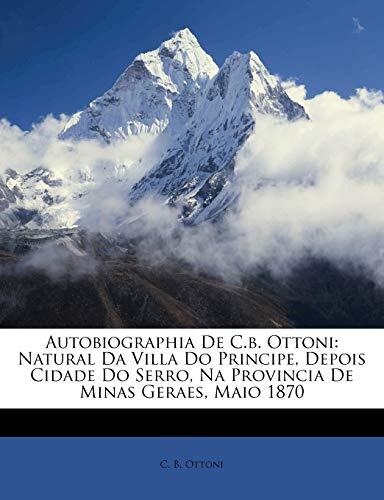
Autobiographia De C.b. Ottoni: Natural Da Villa Do Principe, Depois Cidade Do Serro, Na Provincia De Minas Geraes, Maio 1870
작성자
C. B. Ottoni
아직 평점이 없습니다
Biography
Autobiography & Memoir
형식
페이퍼백
페이지
364
언어
포르투갈어
출판됨
Sep 18, 2011
출판사
Nabu Press
ISBN-10
1245967622
ISBN-13
9781245967624
설명
Set against the vibrant backdrop of 19th century Brazil, this autobiographical work by C.B. Ottoni captures the essence of life in the Villa do Príncipe, which later evolved into the city of Serro in the province of Minas Gerais. Through his personal recounting, Ottoni paints a rich tapestry of his experiences, revealing the social and cultural dynamics of the time. His reflections offer a window into a world shaped by both natural beauty and human endeavor.
Ottoni’s narrative unfolds with a grounding in place, drawing readers into the lush landscapes and the rhythms of community life. His observations touch on the intricacies of local traditions, the challenges of his era, and the interplay between personal ambition and collective heritage. The author’s keen eye for detail invites a deeper understanding of the historical context, enriching the reader’s appreciation of a bygone era.
As he navigates through the challenges and triumphs of his life, Ottoni's voice emerges as a testament to resilience and adaptability. Each chapter serves as not just a personal memoir but as an insightful commentary on the transitions that shaped Brazilian society. The nuanced portrayal of his surroundings and interactions with fellow community members etches a vivid portrait of his journey.
Ultimately, Ottoni's autobiographical account is a significant contribution to the literary landscape, bridging personal history with broader cultural narratives. It invites readers to explore the layers of identity and history that define a region, all while celebrating the power of storytelling to connect generations.
Ottoni’s narrative unfolds with a grounding in place, drawing readers into the lush landscapes and the rhythms of community life. His observations touch on the intricacies of local traditions, the challenges of his era, and the interplay between personal ambition and collective heritage. The author’s keen eye for detail invites a deeper understanding of the historical context, enriching the reader’s appreciation of a bygone era.
As he navigates through the challenges and triumphs of his life, Ottoni's voice emerges as a testament to resilience and adaptability. Each chapter serves as not just a personal memoir but as an insightful commentary on the transitions that shaped Brazilian society. The nuanced portrayal of his surroundings and interactions with fellow community members etches a vivid portrait of his journey.
Ultimately, Ottoni's autobiographical account is a significant contribution to the literary landscape, bridging personal history with broader cultural narratives. It invites readers to explore the layers of identity and history that define a region, all while celebrating the power of storytelling to connect generations.